Agency Law Assignment: Case Studies on Agent's Duties and Liability
VerifiedAdded on 2020/04/07
|7
|1784
|37
Homework Assignment
AI Summary
This document presents a comprehensive solution to an agency law assignment, addressing two distinct case studies. The first case examines the liability of Gabba Pty Ltd for a contract entered into by its agent, Ricardo, exploring concepts of actual and ostensible authority. It analyzes whether the company is obligated to pay Willow Landscaping, focusing on Ricardo's actions exceeding his authorized limit. The second case investigates whether Aspirational Developments can sue Jeremy for breaching his duties as an agent, focusing on Jeremy's actions, including making secret profits, disclosing confidential information, and failing in his duty of care. The solution meticulously applies relevant laws and precedents, including Freeman and Lockyer, Hely-Hutchinson, Northside Developments, Provincial Insurance, and Thornley, to determine the legal implications in each scenario. The document includes a detailed analysis of the issues, relevant law, and application of the law to the facts, culminating in conclusions for each case, along with a comprehensive reference list of case laws and legal texts.

1
Paraphrase This Document
Need a fresh take? Get an instant paraphrase of this document with our AI Paraphraser

2
Cover page
Name of the student
Student ID
Word count
Cover page
Name of the student
Student ID
Word count
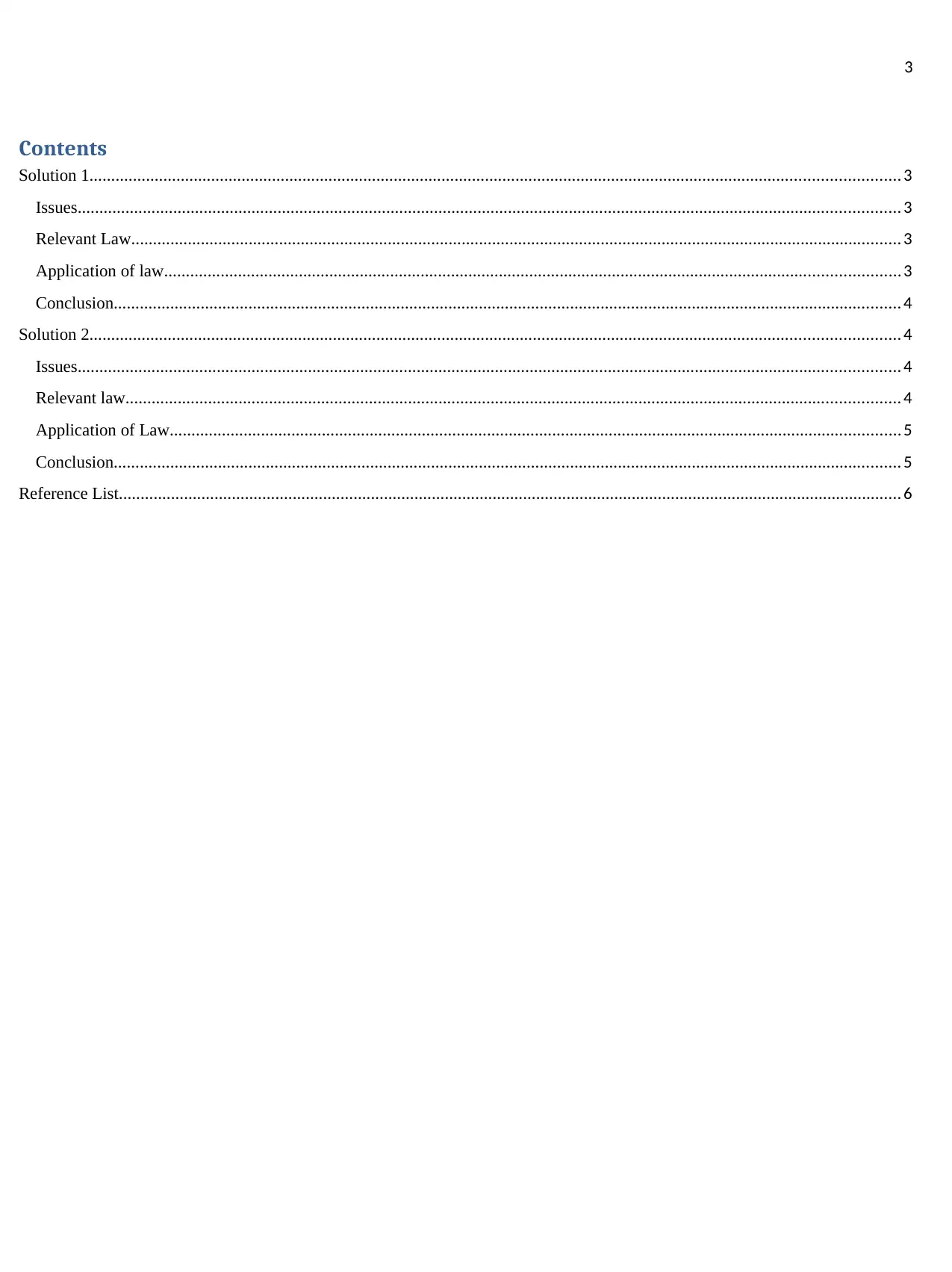
3
Contents
Solution 1.......................................................................................................................................................................................... 3
Issues............................................................................................................................................................................................. 3
Relevant Law................................................................................................................................................................................. 3
Application of law......................................................................................................................................................................... 3
Conclusion..................................................................................................................................................................................... 4
Solution 2.......................................................................................................................................................................................... 4
Issues............................................................................................................................................................................................. 4
Relevant law.................................................................................................................................................................................. 4
Application of Law........................................................................................................................................................................ 5
Conclusion..................................................................................................................................................................................... 5
Reference List.................................................................................................................................................................................... 6
Contents
Solution 1.......................................................................................................................................................................................... 3
Issues............................................................................................................................................................................................. 3
Relevant Law................................................................................................................................................................................. 3
Application of law......................................................................................................................................................................... 3
Conclusion..................................................................................................................................................................................... 4
Solution 2.......................................................................................................................................................................................... 4
Issues............................................................................................................................................................................................. 4
Relevant law.................................................................................................................................................................................. 4
Application of Law........................................................................................................................................................................ 5
Conclusion..................................................................................................................................................................................... 5
Reference List.................................................................................................................................................................................... 6
⊘ This is a preview!⊘
Do you want full access?
Subscribe today to unlock all pages.

Trusted by 1+ million students worldwide
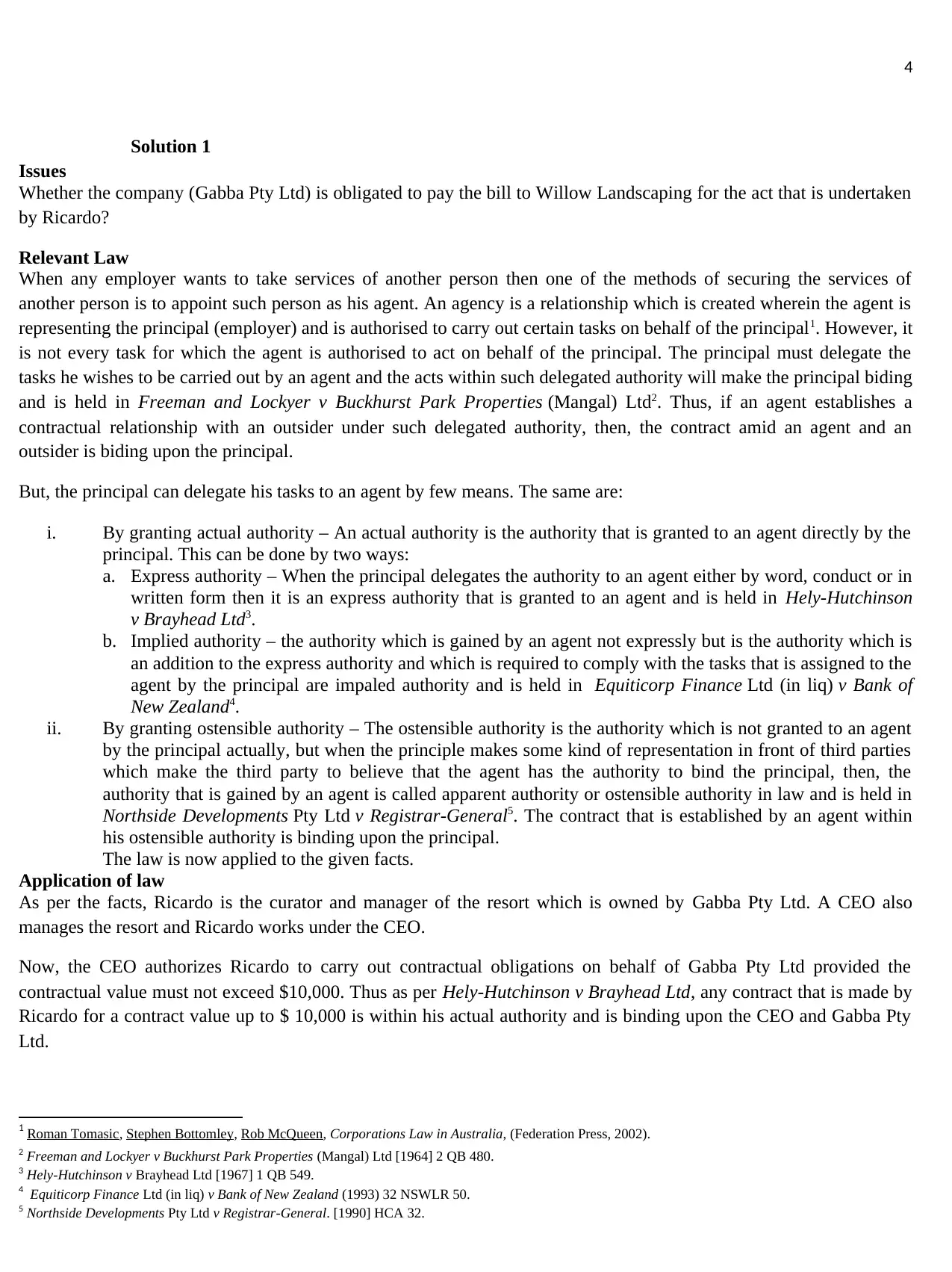
4
Solution 1
Issues
Whether the company (Gabba Pty Ltd) is obligated to pay the bill to Willow Landscaping for the act that is undertaken
by Ricardo?
Relevant Law
When any employer wants to take services of another person then one of the methods of securing the services of
another person is to appoint such person as his agent. An agency is a relationship which is created wherein the agent is
representing the principal (employer) and is authorised to carry out certain tasks on behalf of the principal1. However, it
is not every task for which the agent is authorised to act on behalf of the principal. The principal must delegate the
tasks he wishes to be carried out by an agent and the acts within such delegated authority will make the principal biding
and is held in Freeman and Lockyer v Buckhurst Park Properties (Mangal) Ltd2. Thus, if an agent establishes a
contractual relationship with an outsider under such delegated authority, then, the contract amid an agent and an
outsider is biding upon the principal.
But, the principal can delegate his tasks to an agent by few means. The same are:
i. By granting actual authority – An actual authority is the authority that is granted to an agent directly by the
principal. This can be done by two ways:
a. Express authority – When the principal delegates the authority to an agent either by word, conduct or in
written form then it is an express authority that is granted to an agent and is held in Hely-Hutchinson
v Brayhead Ltd3.
b. Implied authority – the authority which is gained by an agent not expressly but is the authority which is
an addition to the express authority and which is required to comply with the tasks that is assigned to the
agent by the principal are impaled authority and is held in Equiticorp Finance Ltd (in liq) v Bank of
New Zealand4.
ii. By granting ostensible authority – The ostensible authority is the authority which is not granted to an agent
by the principal actually, but when the principle makes some kind of representation in front of third parties
which make the third party to believe that the agent has the authority to bind the principal, then, the
authority that is gained by an agent is called apparent authority or ostensible authority in law and is held in
Northside Developments Pty Ltd v Registrar-General5. The contract that is established by an agent within
his ostensible authority is binding upon the principal.
The law is now applied to the given facts.
Application of law
As per the facts, Ricardo is the curator and manager of the resort which is owned by Gabba Pty Ltd. A CEO also
manages the resort and Ricardo works under the CEO.
Now, the CEO authorizes Ricardo to carry out contractual obligations on behalf of Gabba Pty Ltd provided the
contractual value must not exceed $10,000. Thus as per Hely-Hutchinson v Brayhead Ltd, any contract that is made by
Ricardo for a contract value up to $ 10,000 is within his actual authority and is binding upon the CEO and Gabba Pty
Ltd.
1 Roman Tomasic, Stephen Bottomley, Rob McQueen, Corporations Law in Australia, (Federation Press, 2002).
2 Freeman and Lockyer v Buckhurst Park Properties (Mangal) Ltd [1964] 2 QB 480.
3 Hely-Hutchinson v Brayhead Ltd [1967] 1 QB 549.
4 Equiticorp Finance Ltd (in liq) v Bank of New Zealand (1993) 32 NSWLR 50.
5 Northside Developments Pty Ltd v Registrar-General. [1990] HCA 32.
Solution 1
Issues
Whether the company (Gabba Pty Ltd) is obligated to pay the bill to Willow Landscaping for the act that is undertaken
by Ricardo?
Relevant Law
When any employer wants to take services of another person then one of the methods of securing the services of
another person is to appoint such person as his agent. An agency is a relationship which is created wherein the agent is
representing the principal (employer) and is authorised to carry out certain tasks on behalf of the principal1. However, it
is not every task for which the agent is authorised to act on behalf of the principal. The principal must delegate the
tasks he wishes to be carried out by an agent and the acts within such delegated authority will make the principal biding
and is held in Freeman and Lockyer v Buckhurst Park Properties (Mangal) Ltd2. Thus, if an agent establishes a
contractual relationship with an outsider under such delegated authority, then, the contract amid an agent and an
outsider is biding upon the principal.
But, the principal can delegate his tasks to an agent by few means. The same are:
i. By granting actual authority – An actual authority is the authority that is granted to an agent directly by the
principal. This can be done by two ways:
a. Express authority – When the principal delegates the authority to an agent either by word, conduct or in
written form then it is an express authority that is granted to an agent and is held in Hely-Hutchinson
v Brayhead Ltd3.
b. Implied authority – the authority which is gained by an agent not expressly but is the authority which is
an addition to the express authority and which is required to comply with the tasks that is assigned to the
agent by the principal are impaled authority and is held in Equiticorp Finance Ltd (in liq) v Bank of
New Zealand4.
ii. By granting ostensible authority – The ostensible authority is the authority which is not granted to an agent
by the principal actually, but when the principle makes some kind of representation in front of third parties
which make the third party to believe that the agent has the authority to bind the principal, then, the
authority that is gained by an agent is called apparent authority or ostensible authority in law and is held in
Northside Developments Pty Ltd v Registrar-General5. The contract that is established by an agent within
his ostensible authority is binding upon the principal.
The law is now applied to the given facts.
Application of law
As per the facts, Ricardo is the curator and manager of the resort which is owned by Gabba Pty Ltd. A CEO also
manages the resort and Ricardo works under the CEO.
Now, the CEO authorizes Ricardo to carry out contractual obligations on behalf of Gabba Pty Ltd provided the
contractual value must not exceed $10,000. Thus as per Hely-Hutchinson v Brayhead Ltd, any contract that is made by
Ricardo for a contract value up to $ 10,000 is within his actual authority and is binding upon the CEO and Gabba Pty
Ltd.
1 Roman Tomasic, Stephen Bottomley, Rob McQueen, Corporations Law in Australia, (Federation Press, 2002).
2 Freeman and Lockyer v Buckhurst Park Properties (Mangal) Ltd [1964] 2 QB 480.
3 Hely-Hutchinson v Brayhead Ltd [1967] 1 QB 549.
4 Equiticorp Finance Ltd (in liq) v Bank of New Zealand (1993) 32 NSWLR 50.
5 Northside Developments Pty Ltd v Registrar-General. [1990] HCA 32.
Paraphrase This Document
Need a fresh take? Get an instant paraphrase of this document with our AI Paraphraser
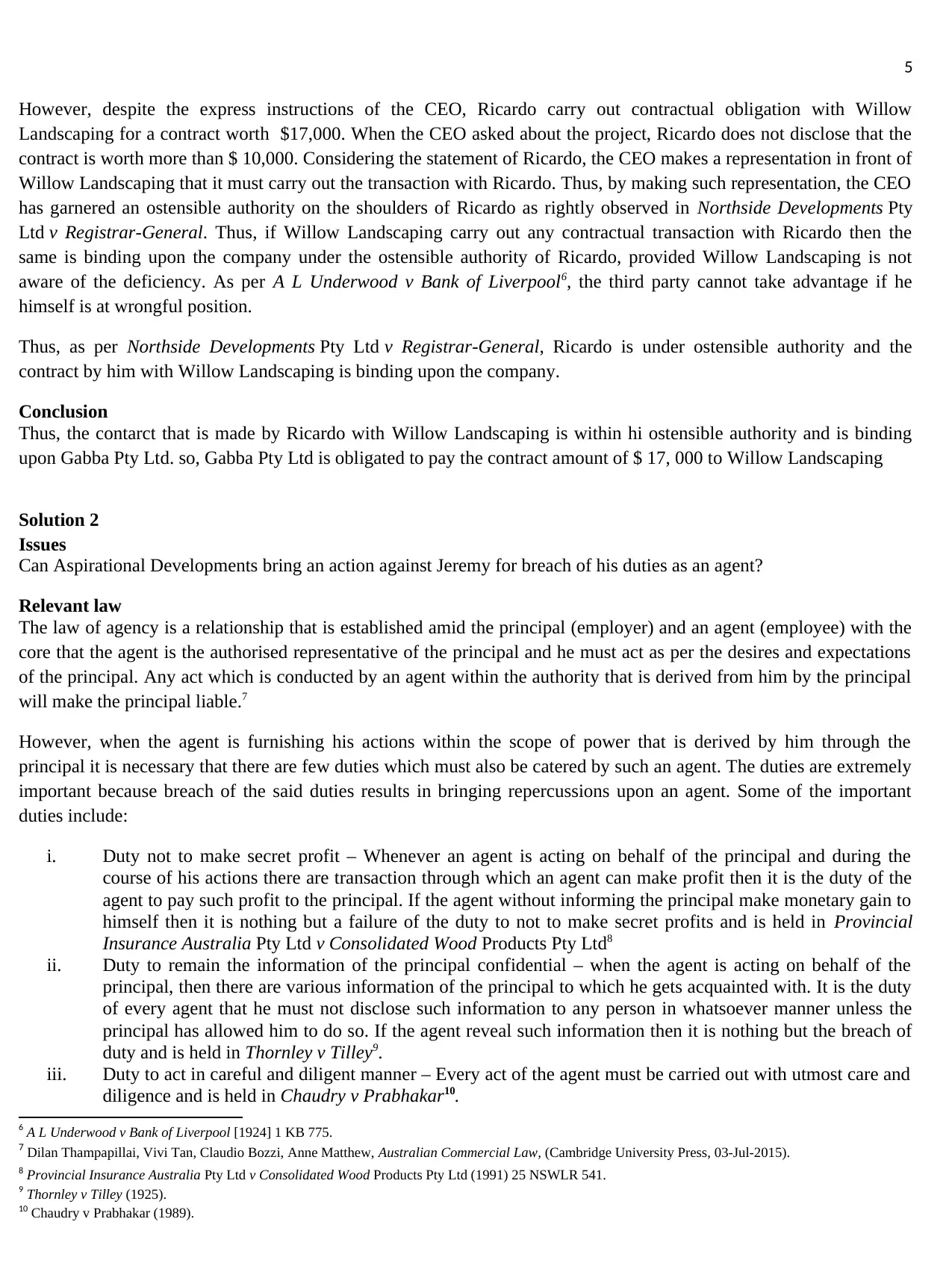
5
However, despite the express instructions of the CEO, Ricardo carry out contractual obligation with Willow
Landscaping for a contract worth $17,000. When the CEO asked about the project, Ricardo does not disclose that the
contract is worth more than $ 10,000. Considering the statement of Ricardo, the CEO makes a representation in front of
Willow Landscaping that it must carry out the transaction with Ricardo. Thus, by making such representation, the CEO
has garnered an ostensible authority on the shoulders of Ricardo as rightly observed in Northside Developments Pty
Ltd v Registrar-General. Thus, if Willow Landscaping carry out any contractual transaction with Ricardo then the
same is binding upon the company under the ostensible authority of Ricardo, provided Willow Landscaping is not
aware of the deficiency. As per A L Underwood v Bank of Liverpool6, the third party cannot take advantage if he
himself is at wrongful position.
Thus, as per Northside Developments Pty Ltd v Registrar-General, Ricardo is under ostensible authority and the
contract by him with Willow Landscaping is binding upon the company.
Conclusion
Thus, the contarct that is made by Ricardo with Willow Landscaping is within hi ostensible authority and is binding
upon Gabba Pty Ltd. so, Gabba Pty Ltd is obligated to pay the contract amount of $ 17, 000 to Willow Landscaping
Solution 2
Issues
Can Aspirational Developments bring an action against Jeremy for breach of his duties as an agent?
Relevant law
The law of agency is a relationship that is established amid the principal (employer) and an agent (employee) with the
core that the agent is the authorised representative of the principal and he must act as per the desires and expectations
of the principal. Any act which is conducted by an agent within the authority that is derived from him by the principal
will make the principal liable.7
However, when the agent is furnishing his actions within the scope of power that is derived by him through the
principal it is necessary that there are few duties which must also be catered by such an agent. The duties are extremely
important because breach of the said duties results in bringing repercussions upon an agent. Some of the important
duties include:
i. Duty not to make secret profit – Whenever an agent is acting on behalf of the principal and during the
course of his actions there are transaction through which an agent can make profit then it is the duty of the
agent to pay such profit to the principal. If the agent without informing the principal make monetary gain to
himself then it is nothing but a failure of the duty to not to make secret profits and is held in Provincial
Insurance Australia Pty Ltd v Consolidated Wood Products Pty Ltd8
ii. Duty to remain the information of the principal confidential – when the agent is acting on behalf of the
principal, then there are various information of the principal to which he gets acquainted with. It is the duty
of every agent that he must not disclose such information to any person in whatsoever manner unless the
principal has allowed him to do so. If the agent reveal such information then it is nothing but the breach of
duty and is held in Thornley v Tilley9.
iii. Duty to act in careful and diligent manner – Every act of the agent must be carried out with utmost care and
diligence and is held in Chaudry v Prabhakar10.
6 A L Underwood v Bank of Liverpool [1924] 1 KB 775.
7 Dilan Thampapillai, Vivi Tan, Claudio Bozzi, Anne Matthew, Australian Commercial Law, (Cambridge University Press, 03-Jul-2015).
8 Provincial Insurance Australia Pty Ltd v Consolidated Wood Products Pty Ltd (1991) 25 NSWLR 541.
9 Thornley v Tilley (1925).
10 Chaudry v Prabhakar (1989).
However, despite the express instructions of the CEO, Ricardo carry out contractual obligation with Willow
Landscaping for a contract worth $17,000. When the CEO asked about the project, Ricardo does not disclose that the
contract is worth more than $ 10,000. Considering the statement of Ricardo, the CEO makes a representation in front of
Willow Landscaping that it must carry out the transaction with Ricardo. Thus, by making such representation, the CEO
has garnered an ostensible authority on the shoulders of Ricardo as rightly observed in Northside Developments Pty
Ltd v Registrar-General. Thus, if Willow Landscaping carry out any contractual transaction with Ricardo then the
same is binding upon the company under the ostensible authority of Ricardo, provided Willow Landscaping is not
aware of the deficiency. As per A L Underwood v Bank of Liverpool6, the third party cannot take advantage if he
himself is at wrongful position.
Thus, as per Northside Developments Pty Ltd v Registrar-General, Ricardo is under ostensible authority and the
contract by him with Willow Landscaping is binding upon the company.
Conclusion
Thus, the contarct that is made by Ricardo with Willow Landscaping is within hi ostensible authority and is binding
upon Gabba Pty Ltd. so, Gabba Pty Ltd is obligated to pay the contract amount of $ 17, 000 to Willow Landscaping
Solution 2
Issues
Can Aspirational Developments bring an action against Jeremy for breach of his duties as an agent?
Relevant law
The law of agency is a relationship that is established amid the principal (employer) and an agent (employee) with the
core that the agent is the authorised representative of the principal and he must act as per the desires and expectations
of the principal. Any act which is conducted by an agent within the authority that is derived from him by the principal
will make the principal liable.7
However, when the agent is furnishing his actions within the scope of power that is derived by him through the
principal it is necessary that there are few duties which must also be catered by such an agent. The duties are extremely
important because breach of the said duties results in bringing repercussions upon an agent. Some of the important
duties include:
i. Duty not to make secret profit – Whenever an agent is acting on behalf of the principal and during the
course of his actions there are transaction through which an agent can make profit then it is the duty of the
agent to pay such profit to the principal. If the agent without informing the principal make monetary gain to
himself then it is nothing but a failure of the duty to not to make secret profits and is held in Provincial
Insurance Australia Pty Ltd v Consolidated Wood Products Pty Ltd8
ii. Duty to remain the information of the principal confidential – when the agent is acting on behalf of the
principal, then there are various information of the principal to which he gets acquainted with. It is the duty
of every agent that he must not disclose such information to any person in whatsoever manner unless the
principal has allowed him to do so. If the agent reveal such information then it is nothing but the breach of
duty and is held in Thornley v Tilley9.
iii. Duty to act in careful and diligent manner – Every act of the agent must be carried out with utmost care and
diligence and is held in Chaudry v Prabhakar10.
6 A L Underwood v Bank of Liverpool [1924] 1 KB 775.
7 Dilan Thampapillai, Vivi Tan, Claudio Bozzi, Anne Matthew, Australian Commercial Law, (Cambridge University Press, 03-Jul-2015).
8 Provincial Insurance Australia Pty Ltd v Consolidated Wood Products Pty Ltd (1991) 25 NSWLR 541.
9 Thornley v Tilley (1925).
10 Chaudry v Prabhakar (1989).
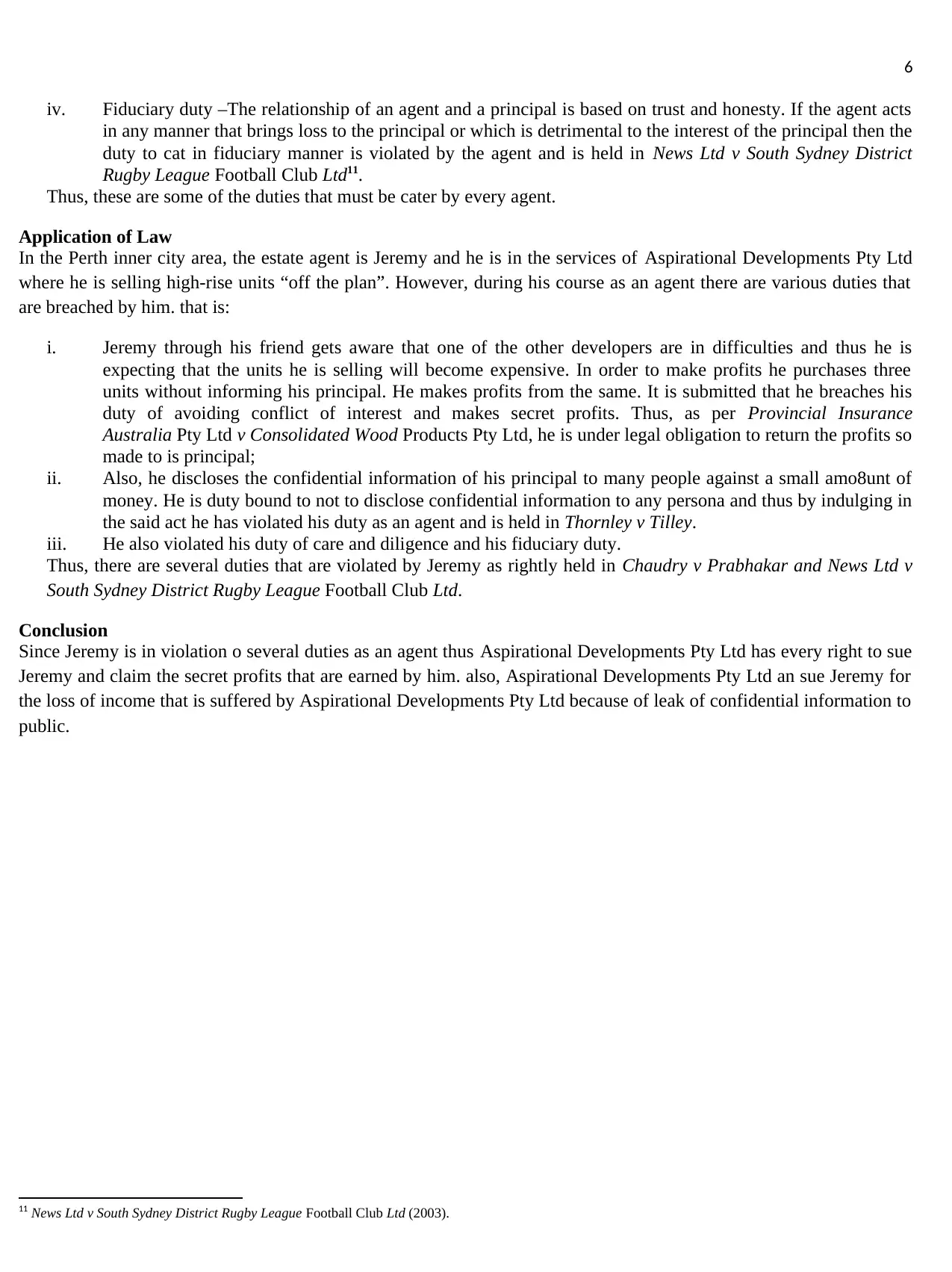
6
iv. Fiduciary duty –The relationship of an agent and a principal is based on trust and honesty. If the agent acts
in any manner that brings loss to the principal or which is detrimental to the interest of the principal then the
duty to cat in fiduciary manner is violated by the agent and is held in News Ltd v South Sydney District
Rugby League Football Club Ltd11.
Thus, these are some of the duties that must be cater by every agent.
Application of Law
In the Perth inner city area, the estate agent is Jeremy and he is in the services of Aspirational Developments Pty Ltd
where he is selling high-rise units “off the plan”. However, during his course as an agent there are various duties that
are breached by him. that is:
i. Jeremy through his friend gets aware that one of the other developers are in difficulties and thus he is
expecting that the units he is selling will become expensive. In order to make profits he purchases three
units without informing his principal. He makes profits from the same. It is submitted that he breaches his
duty of avoiding conflict of interest and makes secret profits. Thus, as per Provincial Insurance
Australia Pty Ltd v Consolidated Wood Products Pty Ltd, he is under legal obligation to return the profits so
made to is principal;
ii. Also, he discloses the confidential information of his principal to many people against a small amo8unt of
money. He is duty bound to not to disclose confidential information to any persona and thus by indulging in
the said act he has violated his duty as an agent and is held in Thornley v Tilley.
iii. He also violated his duty of care and diligence and his fiduciary duty.
Thus, there are several duties that are violated by Jeremy as rightly held in Chaudry v Prabhakar and News Ltd v
South Sydney District Rugby League Football Club Ltd.
Conclusion
Since Jeremy is in violation o several duties as an agent thus Aspirational Developments Pty Ltd has every right to sue
Jeremy and claim the secret profits that are earned by him. also, Aspirational Developments Pty Ltd an sue Jeremy for
the loss of income that is suffered by Aspirational Developments Pty Ltd because of leak of confidential information to
public.
11 News Ltd v South Sydney District Rugby League Football Club Ltd (2003).
iv. Fiduciary duty –The relationship of an agent and a principal is based on trust and honesty. If the agent acts
in any manner that brings loss to the principal or which is detrimental to the interest of the principal then the
duty to cat in fiduciary manner is violated by the agent and is held in News Ltd v South Sydney District
Rugby League Football Club Ltd11.
Thus, these are some of the duties that must be cater by every agent.
Application of Law
In the Perth inner city area, the estate agent is Jeremy and he is in the services of Aspirational Developments Pty Ltd
where he is selling high-rise units “off the plan”. However, during his course as an agent there are various duties that
are breached by him. that is:
i. Jeremy through his friend gets aware that one of the other developers are in difficulties and thus he is
expecting that the units he is selling will become expensive. In order to make profits he purchases three
units without informing his principal. He makes profits from the same. It is submitted that he breaches his
duty of avoiding conflict of interest and makes secret profits. Thus, as per Provincial Insurance
Australia Pty Ltd v Consolidated Wood Products Pty Ltd, he is under legal obligation to return the profits so
made to is principal;
ii. Also, he discloses the confidential information of his principal to many people against a small amo8unt of
money. He is duty bound to not to disclose confidential information to any persona and thus by indulging in
the said act he has violated his duty as an agent and is held in Thornley v Tilley.
iii. He also violated his duty of care and diligence and his fiduciary duty.
Thus, there are several duties that are violated by Jeremy as rightly held in Chaudry v Prabhakar and News Ltd v
South Sydney District Rugby League Football Club Ltd.
Conclusion
Since Jeremy is in violation o several duties as an agent thus Aspirational Developments Pty Ltd has every right to sue
Jeremy and claim the secret profits that are earned by him. also, Aspirational Developments Pty Ltd an sue Jeremy for
the loss of income that is suffered by Aspirational Developments Pty Ltd because of leak of confidential information to
public.
11 News Ltd v South Sydney District Rugby League Football Club Ltd (2003).
⊘ This is a preview!⊘
Do you want full access?
Subscribe today to unlock all pages.

Trusted by 1+ million students worldwide
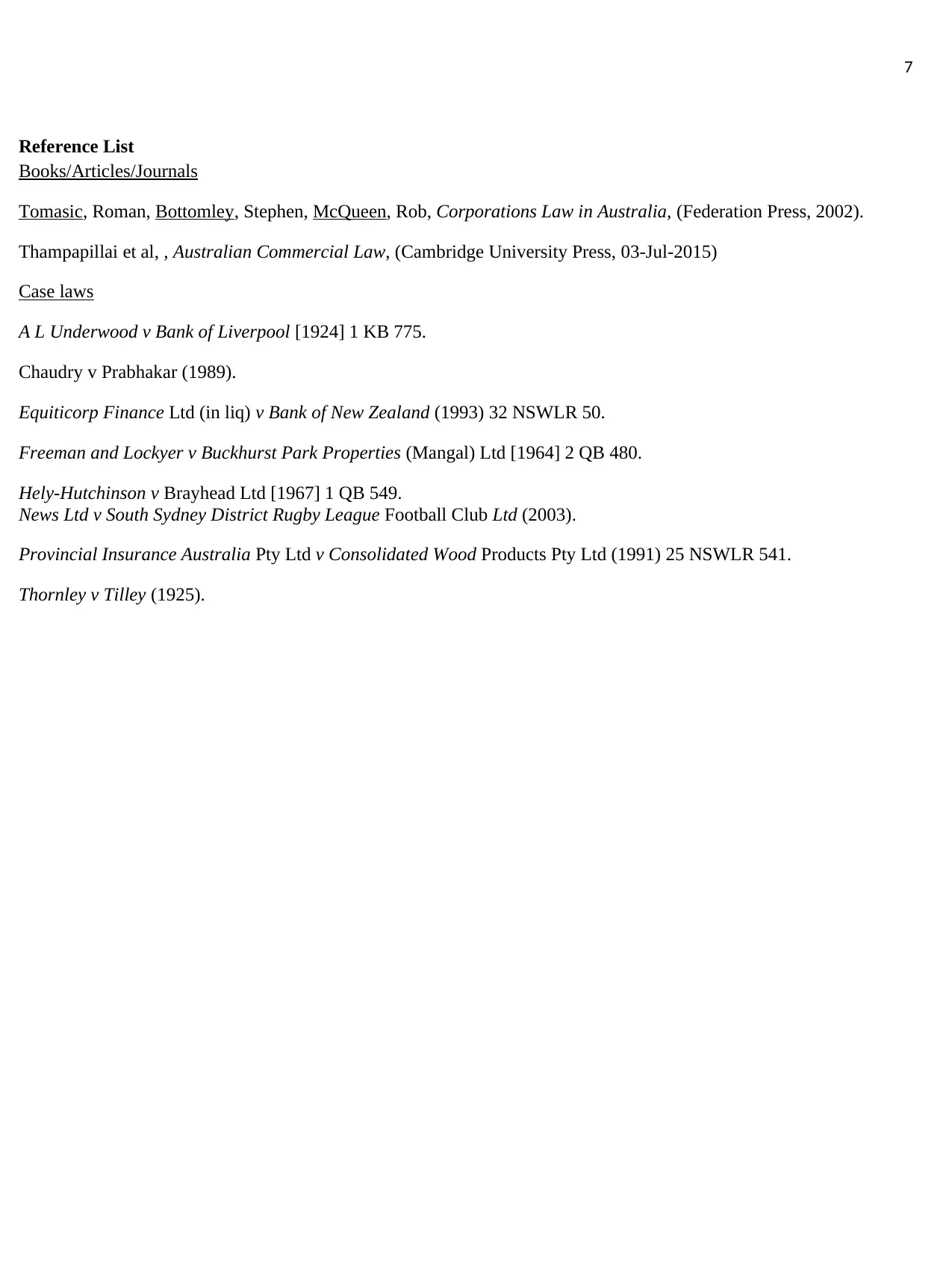
7
Reference List
Books/Articles/Journals
Tomasic, Roman, Bottomley, Stephen, McQueen, Rob, Corporations Law in Australia, (Federation Press, 2002).
Thampapillai et al, , Australian Commercial Law, (Cambridge University Press, 03-Jul-2015)
Case laws
A L Underwood v Bank of Liverpool [1924] 1 KB 775.
Chaudry v Prabhakar (1989).
Equiticorp Finance Ltd (in liq) v Bank of New Zealand (1993) 32 NSWLR 50.
Freeman and Lockyer v Buckhurst Park Properties (Mangal) Ltd [1964] 2 QB 480.
Hely-Hutchinson v Brayhead Ltd [1967] 1 QB 549.
News Ltd v South Sydney District Rugby League Football Club Ltd (2003).
Provincial Insurance Australia Pty Ltd v Consolidated Wood Products Pty Ltd (1991) 25 NSWLR 541.
Thornley v Tilley (1925).
Reference List
Books/Articles/Journals
Tomasic, Roman, Bottomley, Stephen, McQueen, Rob, Corporations Law in Australia, (Federation Press, 2002).
Thampapillai et al, , Australian Commercial Law, (Cambridge University Press, 03-Jul-2015)
Case laws
A L Underwood v Bank of Liverpool [1924] 1 KB 775.
Chaudry v Prabhakar (1989).
Equiticorp Finance Ltd (in liq) v Bank of New Zealand (1993) 32 NSWLR 50.
Freeman and Lockyer v Buckhurst Park Properties (Mangal) Ltd [1964] 2 QB 480.
Hely-Hutchinson v Brayhead Ltd [1967] 1 QB 549.
News Ltd v South Sydney District Rugby League Football Club Ltd (2003).
Provincial Insurance Australia Pty Ltd v Consolidated Wood Products Pty Ltd (1991) 25 NSWLR 541.
Thornley v Tilley (1925).
1 out of 7
Related Documents
Your All-in-One AI-Powered Toolkit for Academic Success.
+13062052269
info@desklib.com
Available 24*7 on WhatsApp / Email
![[object Object]](/_next/static/media/star-bottom.7253800d.svg)
Unlock your academic potential
Copyright © 2020–2026 A2Z Services. All Rights Reserved. Developed and managed by ZUCOL.





